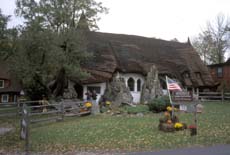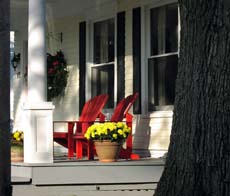index
Keeping "place" a flexible term
click on images for full-size:




A house in Hallowell, Maine

A porch in Lunenburg, Nova Scotia

Providence Place Mall
The meaning I am assigning to the word "place" is both more flexible and more restrictive than the meanings the word takes in many other theories. What is important here is that in the way I have assigned the terms there is no simple opposite for "place" -- there is no unified category of "non-places." There can be areas that are not places but are locations where things happen, in the broad sense, and there can be areas that are not places yet are locales with a striking unified character even though they not socially assigned places for our activity. Most importantly for this discussion, there is no unified notion of non-place that applies to the sorts of areas that many other call non-places: suburban strips, malls, sprawling suburban subdivisions, theme parks, and so on. Such areas are, in my terms, fully places, though they may have oversimplified grammars. It is a great help to thinking clearly if we do not use the term "place" as an honorific for locales we approve of or wish we lived in. Malls and suburban strips are as real places as are cozy homes or central Paris. The mall may not be as complex, or as thick, or as rich, but to call it a non-place blunts the critical mind just when we need it most. We need to figure out what kind of places they are, what kinds of unities hold them together, and how they can be improved, based on their own possibilities. Marc Augé uses the term "non-place" to talk about similar examples, but without any derogatory implications. His discussion is close to my distinction between thick and thin places.